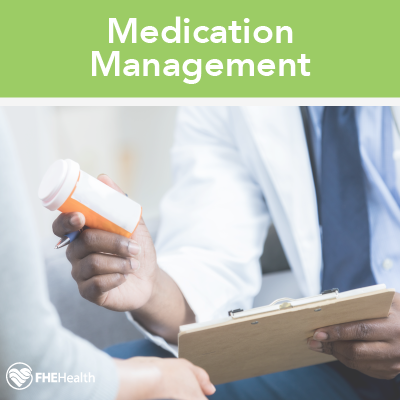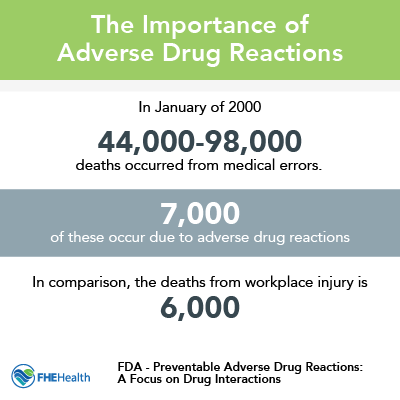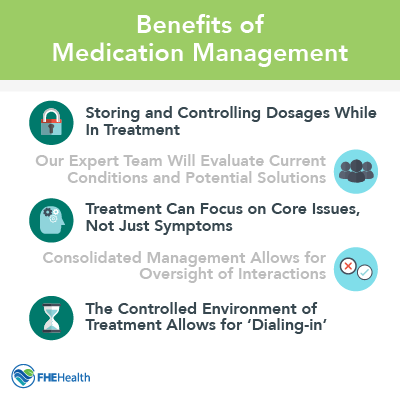Medication management services are a critical component of behavioral health care. This can be true whether you’re seeking treatment for a mental health disorder or an addiction. Medication plays an important role in many treatments, but the incorrect medicine or doses can also cause damage or harm. At FHE Health, we work to provide holistic treatment that addresses the entire person. That includes helping you understand the role of medication (or lack of it) in your treatment and recovery.
What Is Medication Management?
 Medication management covers a wide array of services that ensure you get the right medication and dose and that you are able to leave rehab upon discharge with a stable, manageable medication regime if applicable.
Medication management covers a wide array of services that ensure you get the right medication and dose and that you are able to leave rehab upon discharge with a stable, manageable medication regime if applicable.
Best practices inpatient medication management include:
- Planning which medications may be right for you
- Selecting and procuring the medication, which is typically handled by an on-site pharmacy professional
- Storing the medication to ensure it is safe to use
- Ordering medication, which is handled by a doctor or other professional with the ability to write prescriptions
- Preparing and dispensing medication, which is typically handled by nurses or medical techs under the supervision of nurses
- Administering medication, which may require assistance if the medicine is delivered in a format other than oral
- Monitoring and evaluation to ensure the medication delivers the desired results and side effects are minimal and manageable
Medication management is about ensuring you get the right. individualized, treatment. At FHE Health, we work to ensure medication is provided in a safe, error-free manner that minimizes side effects whenever possible. We also work with you to reduce the chance that medication can be misused, either via misunderstandings or purposeful choices.
We never prescribe medication without explaining its purposes, and because you’re an active participant in your own treatment, you get a chance to weigh in about your goals and preferences when dealing with medication.
Why Medication Is Important for Rehab or Recovery
Medication management services are important for many types of behavioral health treatment. The Substance Abuse and Mental Health Services Administration notes that medication may provide “significant relief” for individuals who are suffering from either mental health or addiction disorders.
Medication to Treat Symptoms
Medication may be required to treat symptoms initially so that the person can reach a point where they can positively interact with therapy. In some cases, medication may be a long-term need. For example, some mental health issues are caused, at least in part, by chemical imbalances in the brain. The right course of medication allows those imbalances to be addressed. According to the SAMHSA, treatment that pairs medication and cognitive behavioral therapy or other types of counseling is often the most effective course of action for successful long-term recovery.
Medication-Assisted Treatment for Addiction
 Patient medication management may take a different course in some cases of addiction. Medication-assisted treatment, or MAT, pairs specific FDA-approved medications with therapy to help foster a higher success rate with detox and rehab.
Patient medication management may take a different course in some cases of addiction. Medication-assisted treatment, or MAT, pairs specific FDA-approved medications with therapy to help foster a higher success rate with detox and rehab.
Specifically, medications may be used to help individuals get through withdrawal periods. Medicines can reduce withdrawal symptoms and make individuals much more comfortable in the first few days or weeks they quit using drugs such as heroin.
Another type of MAT occurs when individuals are prescribed medicine that makes it more likely they’ll abstain from using drugs or alcohol. These medications, which may also help with withdrawal symptoms, block the effects of narcotics. Some ensure that you won’t feel the high of certain narcotics, making drug use less desirable. Others cause you to feel withdrawal symptoms or other negative symptoms if you take narcotics at the same time you are taking the prescribed medication.
As with any type of prescription medication, these types of substances must be administered under the supervision of experienced medical professionals. It’s also important to remember the assisted part of medication-assisted treatment. Information published by the National Institutes of Health notes that medication itself is rarely all it takes for someone to achieve long-term recovery from either addiction or mental health issues. Medicine can treat symptoms but doesn’t often alleviate the underlying psychological, emotional or situational stressors that lead to addiction in the first place.
Other Reasons for Medication Management Services
 Unfortunately, there isn’t always an easy answer as to which medication and in what dose will do the trick for each person. Medication management is especially important in inpatient and intensive outpatient treatment programs because clinicians may need to help you “dial-in” the right dosages.
Unfortunately, there isn’t always an easy answer as to which medication and in what dose will do the trick for each person. Medication management is especially important in inpatient and intensive outpatient treatment programs because clinicians may need to help you “dial-in” the right dosages.
This is very common when dealing with mental health issues. Doctors may start with a basic prescription and work with you to understand whether it’s effective and what side effects occur. In an inpatient or intensive outpatient setting, you’re supervised by medical professionals with enough frequency that issues can be resolved quickly and your medication updated appropriately. The goal is to find a prescription that works best for you.
In some cases, you may be dealing with more than one medication. Management involves handling medication interactions to ensure you are safe. Doctors, nurses, and pharmacists work together to ensure your medications don’t interact dangerously with each other. They also help you become knowledgeable about your medication regime and how it might interact with your lifestyle, so you can remain safe and compliant once you leave inpatient treatment.
Compliance is another part of medication management services. If you need medication to assist with a behavioral health disorder, it’s important that you continue to take the medicine as prescribed. Staff within an inpatient environment help you develop good medication management habits that you can continue with in the future.
Medication for Those With Addiction
If you’re dealing with addiction, you may be scared to take medications. For someone with opioid addiction, for example, pain medicine can be a trigger for ongoing heroin or opioid use. In these cases, medication management services might focus on learning what types of medicines are “safe” for you to use and which you should avoid. Treatment staff can also work with you to develop coping mechanisms to employ during times when you cannot rest on the relief of pain meds or other pharmaceutical remedies.
Whether you need to take medication or can’t take certain meds, medication management services are available to you on an outpatient basis too. As you move from inpatient services into aftercare, you can continue to work with your therapist, psychologist and/or primary care physician to manage your medications in a safe, appropriate way that supports future success.
Holistic Approaches to Recovery
At FHE Health, we strive to deliver holistic approaches to treatment and recovery. Whether you’re dealing with an addiction or a mental health disorder, our caring staff work together to provide comprehensive treatment that includes therapy, medicine and other best practices. For more information about how we can help you on the journey to recovery, contact us today.








